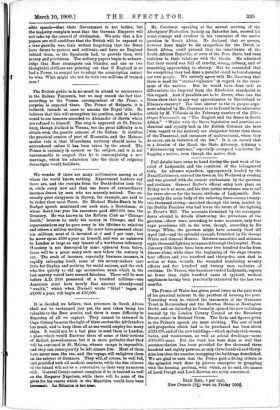It is decided, we believe, that prisoners in South Africa
shall not be exchanged just yet, the men taken being too valuable to the Boer armies, and there is some difficulty in disposing of all we capture. They cannot be interned in Cape Colony because the sight of them excites the Afrikanders too much, and to keep them all at sea would employ too many ships. It would not be a bad plan to send them to London, a place which would disabuse them of some of their notions of British powerlessness, but it is more probable that they will be cantoned in St. Helena, whence escape is impossible, and they can consequently be left almost free. Most of them have never seen the sea, and the voyage will enlighten them on the subject of distances. They will, of course, be well fed, and provided with all medical comforts, while the fine climate of the island will act as a restorative to their very numerous sick. General Cronje cannot complain if he is treated as well as the Emperor Napoleon, while there will be none of the plots for his rescue which in the Mauritius would have been incessant. La Reunion is too near. Mr. Courtney, speaking at the annual meeting of the Aborigines' Protection Society on Saturday last, showed his usual courage and candour in his treatment of the native question in South Africa. He declared that no person, however keen might be his sympathies for the Dutch in South Africa, could pretend that the inhabitants of the South African Republic, or even of the Free State, had been stainless in their relations with the blacks. He admitted that their record was full of cruelty, wrong, robbery, and of something approaching to slavery. But he contended that for everything they had done a parallel could be found among our own people. We entirely agree with Mr. Courtney that there is need for "eternal vigilance" in regard to the treat- ment of the natives. But he would have done well to differentiate the Imperial from the Rhodesian standpoint in this regard. And if parallels are to be drawn, what can the Boers show that in any way approximates to Basutoland or Khama's country ? The best answer to the tu vogue argu- ment adopted by Mr. Courtney is to be found in the admirable article by M. Villarais in the February number of the Bible- taque Universelle on "The English and the Boers in South Africa." "Whilst with the Boers legislation and practice are identical and equally bad, in the British Colonies the laws [with regard to the natives] are altogether better than those of the Transvaal, and instances of maltreatment, when they do occur, are in violation of the law." It is on record that in a Session of the Read, the State Attorney, defining a "dishonouring sentence," especially exempted conviction for flogging a native, even though the native died.






































 Previous page
Previous page